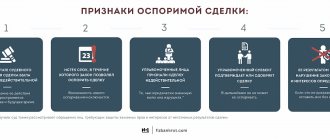After all, not every transaction can be legal and give rise to civil legal relations. Use the sample claim for declaring a transaction invalid due to its insignificance to go to court on your own.
If the transaction is invalid, one of the parties has the right to cancel it in court. If a transaction is of a null nature, then it is initially invalid and is not required to be recognized as such.
However, declaring a transaction invalid due to its insignificance does not mean that everything will happen by itself and the parties will in good faith return to their original position.
What to do if you need to recognize a transaction as void
If an action was committed that led to the conclusion of a void transaction, then recognizing it as such automatically is hardly possible without filing an application in court.
There is an established mechanism for this and it is called invalidation of a transaction due to its insignificance, which is implemented in practice in court.
By filing an application to invalidate a transaction, a person wishes to apply consequences that will not give rise to civil relations with the party that turns out to be dishonest and pursuing its own goals in this transaction.
Legal basis of claim
If you believe that the concluded agreement violates your rights and contradicts the requirements of the law, you can go to court. To do this, you need to determine which of the grounds of invalidity corresponds to your case. An extensive list of grounds is established in paragraph 2 of Chapter 9 of the Civil Code of the Russian Federation and includes agreements concluded:
- under the influence of delusion;
- with an item limited in circulation;
- under threat to health or violence;
- in violation of established norms of law;
- without the purpose of obtaining legal consequences due to the pretense or imaginary nature of the transaction.
Example of a statement of claim to invalidate a transaction
Basmanny District Court
107078, Moscow, st. Kalanchevskaya, 11
Plaintiff: Faleeva Zinaida Lavrentievna
address: Moscow, st. Chernyshevsky, 12, apt. 40.
Defendant: Tokareva Natalya Fedorovna
address: Moscow, st. Chernyshevsky, 12, apt. 18.
Third party: Department of the Federal Service for State Registration, Cadastre and Cartography in Moscow
Statement of claim for invalidation of the apartment purchase and sale agreement
I, Faleeva Zinaida Lavrentievna, am registered and lived in one-room apartment No. 40 with a total area of 30.4 square meters. m., located at the address: Moscow, st. Chernyshevsky, 12.
The ownership of the above apartment belonged to me on the basis of an agreement on the gratuitous transfer of residential premises into the ownership of citizens No. 30054 dated September 23, 2021.
The ownership right is registered in the Office of the Federal Registration Service for Moscow. About which in the Unified State Register of Rights to Real Estate and Transactions with It on October 15, 2018, registration entry No. 74-74-30/090/2009/404 was made and certificate series 74 AB 425503 was issued.
We recommend! Recognition of a transaction with an interest as invalid: legal grounds for challenging + Statement of claim for recognition of a transaction in respect of which there is an interest as invalid
The defendant, Natalya Fedorovna Tokareva, assisted me in privatizing the apartment, contacted a real estate agency, and took me to a notary to draw up documents.
On October 23, 2021, defendant Tokareva Natalya Fedorovna again took me to sign privatization papers.
However, when my relatives visited me, they explained to me that I had signed a purchase and sale agreement for the above-mentioned apartment for 400,000 rubles.
I am an elderly woman, I am 73 years old. Neither when signing the contract, nor subsequently, did anyone explain to me that I had sold my apartment and was not currently the owner.
I thought I was signing a privatization agreement, but in the end I lost my only home. Nobody gave me the money specified in the purchase and sale agreement.
In accordance with Art. 166 of the Civil Code of the Russian Federation, a transaction is invalid on the grounds established by this Code, due to its recognition as such by the court (voidable transaction) or regardless of such recognition (void transaction).
A demand to recognize a voidable transaction as invalid may be submitted by the persons specified in this Code.
A demand for application of the consequences of invalidity of a void transaction may be made by any interested party. The court has the right to apply such consequences on its own initiative.
In accordance with Art. 167 of the Civil Code of the Russian Federation, an invalid transaction does not entail legal consequences, except for those related to its invalidity, and is invalid from the moment of its completion.
If the transaction is invalid, each party is obliged to return to the other everything received under the transaction, and if it is impossible to return what was received in kind (including when what was received is expressed in the use of property, work performed or service provided), reimburse its value in money - if there are other consequences The invalidity of a transaction is not provided for by law.
In accordance with Art. 178 of the Civil Code of the Russian Federation, a transaction made under the influence of a misconception of significant significance may be declared invalid by the court at the claim of the party acting under the influence of the misconception.
Of significant importance is the misconception regarding the nature of the transaction or identity or such qualities of its subject matter that significantly reduce the possibility of its use for its intended purpose. The misconception regarding the motives for the transaction is not significant.
If a transaction is declared invalid as made under the influence of a mistake, the rules provided for in paragraph 2 of Article 167 of this Code are applied accordingly.
We recommend! Sham gift agreement: terms for challenging the transaction, examples of judicial practice
Based on the above and in accordance with Art. 166, 167, 178 Civil Code of the Russian Federation
I ask the court:
1) Invalidate the purchase and sale agreement dated October 23, 2018 for a one-room apartment with a total area of 30.4 square meters. m., located at the address: Moscow, st. Chernyshevsky, 12. apt. 40, concluded between me and Natalya Fedorovna Tokareva.
2) Cancel state registration of ownership of a one-room apartment with a total area of 30.4 square meters. m., located at the address: Moscow, st. Chernyshevsky, 12, apt. 40, in the name of Natalya Fedorovna Tokareva.
3) Recognize for me, Faleeva Zinaida Lavrentieva, the ownership of a one-room apartment with a total area of 30.4 square meters. m., located at the address: Moscow, st. Chernyshevsky, 12. apt. 40.
Application:
1) Receipt for payment of state duty.
2) Copies of statements of claim according to the number of persons participating in the case.
3) A copy of an extract from a financial personal account.
4) A copy of the purchase and sale agreement dated October 23, 2021.
5) A copy of the certificate of state registration of the right.
November 27, 2018 Faleeva Zinaida Lavrentievna.
Claim to declare a transaction invalid due to its insignificance
In order to apply the institution of restitution in civil relations, the party is forced to file a claim to declare the transaction invalid due to its insignificance. When drawing up a claim, you must proceed from the legal structure of the nullity of the transaction.
Insignificance may be manifested in the following actions:
- The purpose of the transaction is opposed to the rule of law in civil relations and public morality. Such transactions are qualified as knowingly made with a certain intent.
- Participation on the side of civil legal relations of an incapacitated person who suffers from either mental illness or dementia. Concluding a transaction with such persons will be insignificant and the guilt of the other party will be obvious. Since not paying attention to such qualities of the party’s incapacity will be a clear intention and have selfish goals.
- Carrying out transactions with a person under 14 years of age, with the exception of small transactions of a household nature. Also, concluding agreements on the alienation of real estate with such a person will be obvious and with the intent of the other party, since such an age can be distinguished from a fully capable person. It will be sufficient to require a passport certifying that you have reached the age of fourteen.
- The imaginary nature of a transaction that involves the creation of visible conditions, but does not create clear intentions for specific legal consequences.
- The pretense of the transaction is intended to replace the main one, which is essentially hidden by the parties.
We recommend! Invalidation of auction results + sample claim to arbitration court and general jurisdiction
Thus, all of the listed legal cases must be clearly reflected in the claim to invalidate the transaction.
The procedure for challenging transactions in court
As we have already indicated earlier, the law may establish a mandatory procedure for pre-trial dispute resolution. In this case, the initial stage in any case will be filing a claim. Otherwise, your application may remain without consideration, which will delay the consideration of the dispute. If you have already filed a claim with the parties to the transaction, the procedure for challenging will be as follows:
- Formation of a position on the case . At this stage, you need to work with your lawyer to determine the legal basis of your claims.
- Collection of evidence . It is better to prepare for the trial in advance. This will also eliminate the red tape of the dispute associated with sending court requests to demand certain documents.
- Preparing an application to the court . Considering that recently a large number of changes have been made to procedural legislation, contacting a lawyer will reduce the risks of your application being returned or left without progress. It is especially important to correctly formulate requirements and determine the parties to the dispute.
- Filing a claim in court . Again, we draw attention to changes to procedural legislation. Now you independently notify the opposing party of the filing of a claim.
- Trial . At this stage, before the court, you must defend your position by providing evidence.
USEFUL : see how to behave in a court case right now
Terms for recognizing a transaction as void
In recognizing an interested party transaction as void, its terms have been changed in the new legislation. Namely, in the new version of the law, the period for recognizing a transaction as void is regulated as 10 years from the moment the parties began to fulfill the terms of the transaction.
In contrast to the period for declaring a transaction void, contestable ones can be presented within a period of one year, the beginning of which is associated with the commission of acts of misrepresentation or simply when the citizen learned of such circumstances.
Thus, the legislator took the path of improving civil law relations and provided a significant amount of time to resolve the consequences of the nullity of the transaction.
Invalidation of a void transaction
The procedure for invalidating a void transaction requires practical skills and efforts possessed by qualified specialists.
This process can only be started in court, since due to the bad faith of the parties to the transaction, all actions to return to the original appearance will be in vain.
The procedure that returns the parties to the previous state before the transaction was completed is called restitution. It is not possible to organize it out of court and without practical skills, of course taking into account the specific circumstances and scope of the transaction itself.
Therefore, it is better to entrust the settlement of the issue of restitution to the court, which, having examined the materials on the transaction, will be able to establish one or another fact of the nullity of the transaction. And ultimately cancel its consequences, protecting the interests of the bona fide party
Pre-trial procedure for challenging a transaction
Of course, not all controversial situations reach the courts. And in disputes about challenging a particular transaction, it is possible to resolve the controversial issue before filing a claim.
And this procedure actually comes down to filing a claim with the party or parties that violated your rights. It is worth canceling that in disputes related to business activities, this procedure is mandatory. And the legal grounds underlying your claim will be taken into account by the court when considering your claim in the future. So, for example, having filed a claim on one basis, you will no longer be able to change them in court. Therefore, it is important to begin pre-trial work with a qualified lawyer.
Let's talk about the consequences of satisfying your claim. So, for example, if the parties to the disputed transaction recognize the requirements of your claim as justified, the following scenarios are possible:
- Termination of the deal . It can be formalized by the parties to the disputed transaction in writing. And then virtually all parties to the conflict will return to their original position;
- Waiver of Rights . So, for example, if the testator bequeathed an apartment to a third party, and he recognized your claims that the testator at the time of the transaction could not understand the meaning of his actions, he can simply present to the notary a statement of refusal to enter into the inheritance. This will eliminate all risks associated with the illegal transfer of rights to property.
USEFUL : watch the video on the rules for filing a claim










